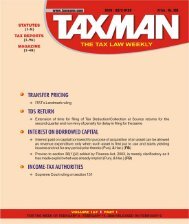CPT V24P7-Art1 (Content).pmd - Taxmann
CPT V24P7-Art1 (Content).pmd - Taxmann
CPT V24P7-Art1 (Content).pmd - Taxmann
Create successful ePaper yourself
Turn your PDF publications into a flip-book with our unique Google optimized e-Paper software.
Direct Tax Laws<br />
The High Court ultimately held that the Tribunal<br />
had erred in setting aside the order of the<br />
Commissioner of Income-tax (Appeals) in its<br />
entirety and by restoring the proceedings to<br />
the Assessing Officer in regard to the<br />
disallowance to the extent of ` 28.69 lakhs and<br />
confirmed order of the Tribunal only to the<br />
extent to which it restored the proceedings to<br />
the Assessing Officer as regards the amount<br />
of ` 13.73 lakhs<br />
The High Court, however, observed that the<br />
assessee, if so advised, could take necessary<br />
steps for restoration of the appeal before the<br />
Tribunal which was dismissed earlier for nonprosecution<br />
by the assessee. The High Court<br />
also observed that it would be open to the<br />
Tribunal to deal with such application, when<br />
made by the assessee for restoration of appeal,<br />
in accordance with law.<br />
5. OTHER IMPORTANT DECISIONS<br />
5.1 The Kerala High Court in the case of CIT<br />
v. Commonwealth Trust (India) Ltd. [1996]<br />
221 ITR 474/87 Taxman 393 in which it was<br />
observed that - The law of procedure has to<br />
be approached, understood and appreciated<br />
as a helpmate in the course of the process of<br />
administration of justice and never as a situation<br />
of obstruction or obstacle in regard thereto.<br />
The High Court, therefore, held that “even<br />
though limitation is not specifically set up as<br />
a defence, a barred proceeding has to be<br />
dismissed. Rule 27 of the ITAT Rules, 1963,<br />
enacts that the respondent (in this case the<br />
assessee) may support the order, though he<br />
may not have appealed, on any of the grounds<br />
decided against him.”<br />
5.2 The Supreme Court in the case of<br />
Hukumchand Mills Ltd. v. CIT [1967] 63 ITR<br />
232 - Held that Rule 12 (dealing with rejection<br />
of memorandum of appeal) and Rule 27 of the<br />
Appellate Tribunal Rules, 1946, (the ITAT<br />
Rules,1946) are not exhaustive of the powers<br />
of the Tribunal. They are merely procedural<br />
in character and do not, in any way, circumscribe<br />
or control the power of the Tribunal under<br />
634<br />
August 1 to 15, 2012 u TAXMANN’S CORPORATE PROFESSIONALS TODAY u Vol. 24 u 14<br />
section 33(4) of the Indian Income-tax Act,<br />
1922.It is to be noted that the earlier rule 27<br />
of the Appellate Tribunal Rules, 1946 was on<br />
the same lines as the rule 27 of Income-tax<br />
(Appellate Tribunal) Rules, 1963. It is further<br />
to be noted that provisions of section 33(4) of<br />
the 1922 Act were akin to section 253 of the<br />
Act.<br />
5.3 The Madras High Court in the case of CIT<br />
v. Sundram & Co. (P.) Ltd. [1964] 52 ITR 763<br />
- It was held that “Rule 27 of the ITAT Rules,<br />
1946, confers a right on the respondent in an<br />
appeal to the Appellate Tribunal to support<br />
the order of the Appellate Assistant<br />
Commissioner, on any of the grounds decided<br />
against him, even though he may not have<br />
himself preferred an appeal to the Tribunal.<br />
Being a right conferred on the respondent, the<br />
Tribunal has no right in its discretion to deprive<br />
him of the benefit of this rule.”<br />
5.4 The Madras High Court in the case of<br />
M.R.M. Periannan Chettiar v. CIT [1960] 39<br />
ITR 159 - Held that “Rule 27 recognizes the<br />
principle that the Appellate Tribunal would<br />
have authority only to decide the question<br />
decided by the Appellate Assistant Commissioner<br />
against the appellant, and makes a special<br />
provision, enabling the respondent alone to<br />
support the order on a ground decided against<br />
him.” The Madras High Court also opined<br />
that the existence of an appeal which related<br />
only to a distinct matter in controversy did<br />
not entitle the Tribunal to take up and decide<br />
the appeal in favour of the appellant on the<br />
basis of a ground not in controversy by taking<br />
recourse to any of the ITAT Rules,1946.<br />
5.5 The ITAT Chandigarh Bench in the case of<br />
Asstt. CIT v. Balbir Chand Maini [2007] 111<br />
TTJ 160 - Held that where issue relating to<br />
validity of reopening was decided against<br />
assessee, in light of rule 27 of the ITAT Rules,1963,<br />
assessee was entitled to contest issue in an<br />
appeal filed by Revenue.<br />
5.6 Durgeshwari Investments (P.) Ltd. v. ITO<br />
[2005] 146 Taxman 56 (Mum.)(Mag.) - The facts<br />
of the case which arose in Durgeshwari Investments











![“FORM NO. 3CEB [See rule 10E] Report from an ... - Taxmann](https://img.yumpu.com/45480232/1/190x245/form-no-3ceb-see-rule-10e-report-from-an-taxmann.jpg?quality=85)





